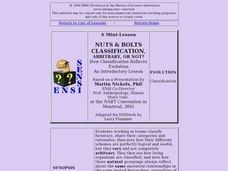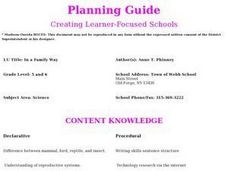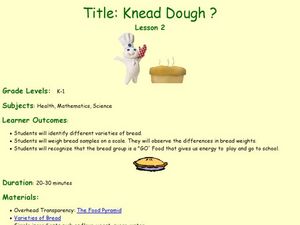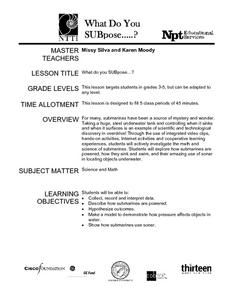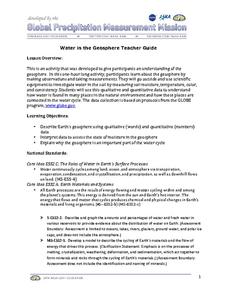Curated OER
Classification of Materials
Students classify photographs into a two-way classification system. They practice with pictures of people who are young and old, male and female, then they use pictures of animals to create their own two-way classification system.
Curated OER
Classification
Second graders sort insects into groups by determining similar characteristics. They role play as Entomologists to sort insects.
Curated OER
Pheed the World: Edible Phyla
Young scholars discuss the contributions of different organisms to our world. In this biology lesson plan, students research countries with limited food supply. They create an improvement plan for a fictitious country assigned to them.
Curated OER
Nuts & Bolts: is Classification, Arbitrary, Or Not?
Students, in groups, classify furniture, share their categories and rationales, then note how their different schemes vary, perfectly logical and useful, but completely arbitrary.
Curated OER
Sink or Float?
Students predict and explore to discover which objects sink or float in fresh and salt water, predict how salt affect objects, write predictions on T chart, discuss difference between man-made and natural waters, and graph results.
Curated OER
In a Family Way
Students research a rare species of animals that are a step away from the well known animals of our zoos. They create a mobile which displays the geography, habits, population and habitat of the animals. They draw a picture.
Curated OER
Knead Dough?
Pupils make bread and understand that bread gives us energy. In this bread lesson plan, students read the story A Trip to the Market, and learn about the importance of bread. Then they make the bread!
Curated OER
Tie Dye
Students practice writing research proposals to test the color fastness of a dye once it has been exposed to a t-shirt. Each proposal needs details of experimental design, length of treatment, and means of cleaning the shirt. All...
Curated OER
What are Igneous Rocks and How are They Formed?
Crystals form before your very eyes! What sixth grader wouldn't enjoy this lesson plan on igneous rock formation? Using hot Salol, junior geologists observe the crystal formation process as the material cools. This comprehensive lesson...
Curated OER
What Do You SUBpose?
Submarines are the fous of this math and science lesson. In it, learners explore the world of submarines: how they work, and what they are used for. They engage in hands-on activities, watch video clips, and work in cooperative groups in...
Virginia Department of Education
Charles’ Law
Searching for a relatively interesting way to demonstrate Charles' Law? Here is a instructional activity in which pupils heat air inside a flask and then cool the flask to quickly cool the air. They make observations about what occurs...
PHET
Planet Designer: Retro Planet Red
What does the atmosphere on Mars look like? This fourth lesson in the series of five is designed for high schoolers. Scholars apply previous knowledge to add atmosphere to Mars in an online simulation. This comprehensive lesson includes...
Discovery Education
The Everyday Science of Sports
Physical science juniors will enjoy this sensational enrichment on aerodynamics, especially if they are also sports fans! With a focus on physical features and behaviors, collaborative groups make observations on five different golf...
Curated OER
Water in the Geosphere
Through a PowerPoint presentation and the embedded animation and video, earth science enthusiasts find out about the moisture in the soil beneath our feet. In the animation, follow a water molecule on its path through the water cycle. As...
Curated OER
Exploration of 'pill bugs'
Fifth graders define words. They create a dichotomous key. After carefully examining pill bugs, 5th graders record observations. They compare and contrast habitats of pillbugs.
Curated OER
Lab Experiments in Nutrition
Looking for authentic hands-on nutritional experiments? High schoolers will perform experiments to test for the presence of vitamin C in several solutions as well as the effect of caffeine on Daphnia. They will also consider the...
PHET
Planet Designer: Martian Makeover
Mars used to have liquid water, can you make it come back? Use the lesson and simulation to understand why Mars lost its magnetic field, why atmosphere is important, and what gravity has to do with it. This is the third lesson in a...
Virginia Department of Education
The Particle Theory of Matter
Demonstrate the particle theory of matter to high school scientists with an engaging experiment that allows them to visually see the results as substances change from one state to another. The class concludes with a discussion about how...
Curated OER
Changing Planet: Black Carbon - a Dusty Situation
Introduce your young meteorologists to black carbon produced by the burning of fossil fuels by showing the video, "Changing Planet: Black Carbon." Viewers discover that deposition of this carbon on polar ice impacts the absorption of...
Field Museum
The Case of Darwin's Finches
One of the most striking pieces of evidence for Darwin's Evolution of Species was his observations of finches and how their beaks differed from island to island, depending on their primary food sources. So what would happen to the theory...
Curated OER
Discovering Friction
Students watch a demonstration that introduces them to the idea that friction is a force that impedes motion when two surfaces are in contact. They work in groups to experiment with frictional force using a coffee cup on which they alter...
Curated OER
The Impact
Students study inventions and the impact they have had on people. In this investigative lesson students learn how inventions are created and take part in a design project that will allow them to solve problems.
Curated OER
Backyard Critters
Young scholars explore the characteristics of invertebrates in their backyards. They observe, describe, and classify specimens. They conclude with a "snail race."
Texas State University
Earth: Deposition and Lithification
Geology geniuses analyze sediment samples with a hand lens and sort according to physical characteristics. They also learn about the processes of cementation, compaction, and lithification within the rock cycle. The lesson plan is...





